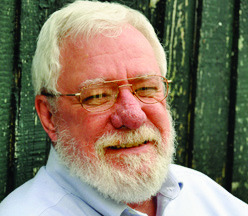Today’s weather gurus use sophisticated computers to model all of the forecast possibilities as fronts push this way and that, pockets of high or low pressure skip hither and yon, and jet streams meander through the atmosphere, but the imprecise science of weather prediction still comes down to the interpretation of signs and wonders by humans who get it wrong on a regular basis.
Modern meteorologists say a seven-day forecast can accurately predict the weather about 80 percent of the time, and a fiveday forecast can do so about 90 percent of the time. A 10-day forecast is only right about half the time, and after that it’s pure guesswork.
I wrote the weather column for the Lafayette Advertiser for many years, and, without any meteorological training, probably matched those numbers. It seems that my guess was as good as anybody’s.
That’s why I think Francois Arago, “Perpetual Secretary of the French Academy of Sciences” in the middle 1800s, had the right perspective on the “science.” He got really mad when somebody accused him of trying to give weather forecasts.

Bradshaw
Bradshaw
“Never has a word escaped my lips,” he said, “never has a line published with my consent, authorized any one to imagine it to be my opinion that it is possible … to announce with any degree of certainty, what weather it will be a year, a month, a week, I shall even add, a single day, in advance. ... Whatever may be the progress of science, never will observers who are trust‑worthy and careful of their reputations venture to forecast the state of the weather.”
Mark Twain mocked the forecasters by giving his own prediction for the coming weather during one of his speeches: “Probable nor’-east to sou’-west winds, varying to the southard and westard and eastard and points in between; high and low barometer, sweeping round from place to place; probable areas of rain, snow, hail, and drought, succeeded or preceded by earthquakes with thunder and lightning.”
Of course, neither Arago or Twain lived in south Louisiana in July and August, when a summer weather pattern gets so well established that a fourth-grader can predict it: Hot night, hotter day, a good chance of a shower as the sun heats up moisture coming in from the Gulf.
When that pattern sets in there’s nothing to do but follow the advice offered in the Franklin Planters’ Banner during the summer of 1852: Use plenty of ice and stay in the shade.
“It has been remarked a thousand times,” the newspaper’s editor wrote, “that were it not for the excessive heat of Louisiana in the summer months … she would be by far the most delightful State in the Union to reside in. This is certainly true; and when the remark is made, no one ever thinks that the disadvantage of climate could ever be remedied. But … by a plentiful use of ice the climate of Louisiana may be moved many miles north.”
The writer explains that our “animal heat … is generated in the stomach,” and “if by a plentiful use of ice in the many delightful and elegant ways that it can be employed, the stomach is reduced to a certain temperature, the animal heat of the whole body will be reduced with it, and a man can sit in the shade, with the thermometer at 98 degrees and feel just as comfortable as if it were really at 50.”
The writer thought ice makes us not only more comfortable, but also healthier, “for the cause of three-fourths of the summer maladies of this climate proceed from the fact, that the stomach, when heated above a certain point, whether by intemperance, violent exercise, inflammation or heated atmosphere, will not digest its contents.”
There you have it: Find a shady spot, drink an iced beverage (prepared in a delightful but temperate way), and by all means avoid violent exercise.
You can contact Jim Bradshaw at [email protected] or P.O. Box 1121, Washington LA 70589.

